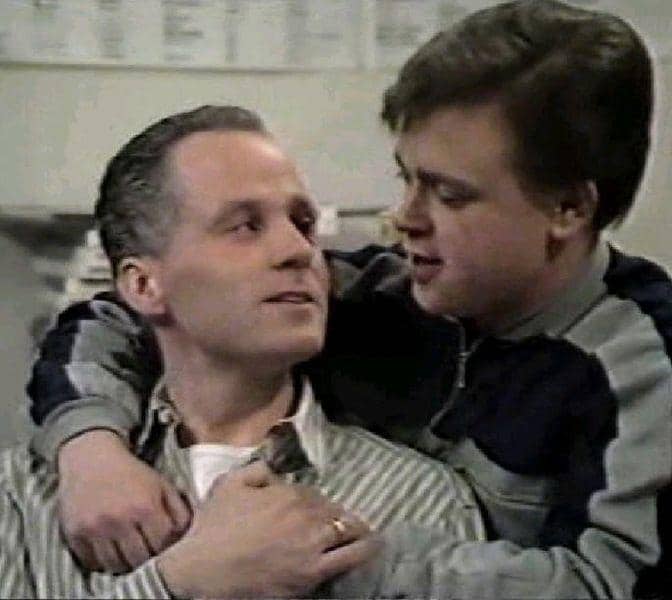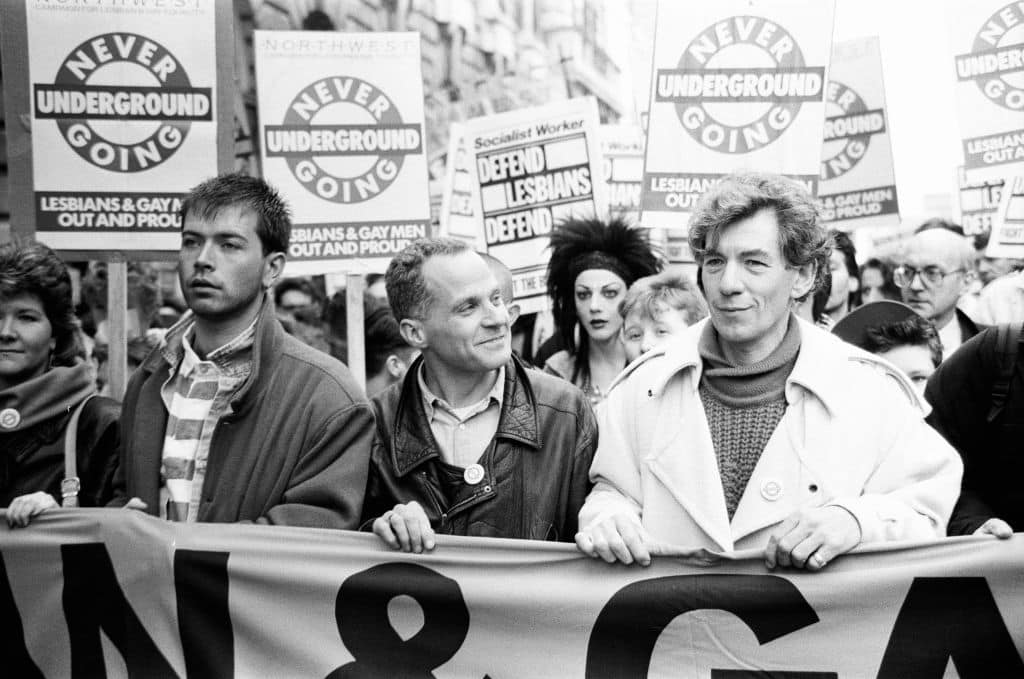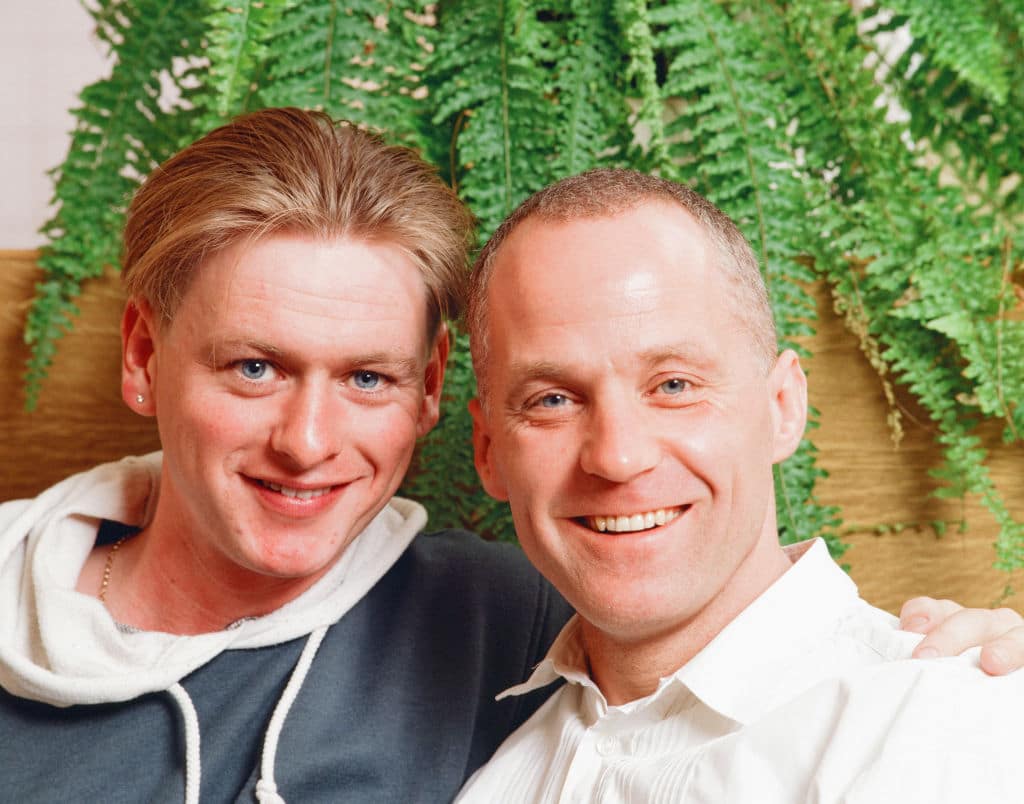Michael Cashman on how vicious tabloid homophobia turned him into an activist: ‘It was horrendous’

Michael Cashman will be speaking about his life and memoir at the Coast is Queer festival. (Supplied)
Michael Cashman wasn’t prepared for the level of homophobia he would face when he was cast as a gay character on EastEnders.
From the moment he joined the soap as Colin Russell in 1986, Michael was subjected to a torrent of homophobic abuse from British tabloids. Newspapers wrongly claimed he had AIDS; one even published his address, which led to a brick being thrown through his window.
“I never imagined the tabloid onslaught,” Michael tells PinkNews. He expected problems – it was a hostile time for queer people to begin with – but he never could have imagined just how bad things would get.
Michael didn’t let the abuse deter him. In fact, his early years on EastEnders inspired him to become an LGBTQ+ rights activist, which ultimately led to him entering politics – enjoying a long career and now a member of the House of Lords.
His extraordinary story is laid out in his memoir One of Them, published in 2020. He’ll be discussing his book, and his fascinating life, with EastEnders writer Pete Lawson at the Coast is Queer festival in Brighton on 9 October.
To say Michael’s EastEnders trajectory was history-making somehow feels like an understatement. At the height of the AIDS epidemic, the widely watched BBC soap beamed the image of two men kissing and building a relationship into people’s homes. He’s proud of that legacy, even if it meant he had to endure some vitriol along the way.

Lord Cashman as Colin in Eastenders. (BBC)
“I wasn’t prepared for the level of misrepresentation, misinformation, defamation, and also the outing of my partner Paul [Cottingham],” Michael reflects, more than 35 years since his character Colin Russell first arrived in Albert Square.
“Paul was outed on the centre pages to his family and friends with the headline, ‘Secret gay love of AIDS scare EastEnder‘ – again, that tabloid thing of putting gay and AIDS together, reinforcing that notion at the time that AIDS was a gay plague.
“I was ready for the intrusion,” Michael clarifies, “but I wasn’t ready for that homophobia.”
More than 30 years later, Michael readily admits he wouldn’t have gotten through it without the support of his late husband. Paul tragically died from cancer in 2014.
“It was horrendous, the stories that they made up. I was told, take it, wait, they’ll step over the line and when do they step over the line, sue them – and I did.
“I sued Rupert Murdoch’s The Sun and The News of the World and then later a couple of other newspapers because I thought, you can’t do that – you can criticise me for what I do, but the indulgence and slurs and defamation and libel is a step over, which I will not allow you to take.”
‘A very positive step forward’
Looking back at that time, he thinks it must have taken the BBC – and the producers of EastEnders – a lot of courage to introduce two gay characters in what was a hostile era.
“I think we cannot underestimate the courage of the BBC and [producer] Julia Smith, in particular, in bringing into the most popular show on British television two gay characters,” Michael Cashman says, referencing Colin’s on-screen boyfriend Barry, played by Gary Hailes.
“Bringing it into this popular show meant that there was a political outcry. There were questions raised in parliament about why gay characters, or homosexuals, as they called them, were being portrayed in a family show, and a family show that went out before the watershed hour.
“But for LGBT people it was huge because it was the first time we had seen in a major television series, like a soap, two gay men portrayed in a very ordinary way.”

Michael Cashman on EastEnders. (BBC)
Even now, Michael meets people who tell him that his character’s arc made them feel less alone.
“One man said, ‘I used to stand behind the sofa and watch it so my parents couldn’t see me watching you.’
That first gay kiss, those tender moments between Colin and Barry, the tender moments between Colin and Angie in the pub and with the other residents of Albert Square, were bright moments on a very dark landscape.
“We were dealing with the deaths and the mutilation of our community through AIDS and HIV, so it was a very positive step forward.”
Section 28 changed the game
Michael’s EastEnders fame couldn’t have come at a better time – Section 28 was introduced in 1988, two years after he made his EastEnders debut, meaning he had a platform to fight it.
Section 28 – which banned the promotion of homosexuality by local authorities – turned Michael into an activist. In turn, that opened the door to politics.
“I think if I hadn’t gone into EastEnders at that time, taken that part, stood up against Section 28, I wouldn’t have ended up in the European Parliament for 15 years, I wouldn’t have co-founded Stonewall, I wouldn’t have gone on to chair the Labour Party, I wouldn’t have ended up where I am now in the House of Lords. It’s all a result of being in that show, playing that part, at that time,” he says.
In fact, before Section 28 came along, Michael had “no intention” of becoming an activist.
“I was what I call a low-key activist. I went on demonstrations, I wrote letters, I did it through my membership of the Labour Party, I stood outside hospitals to prevent them being closed, but I didn’t consider myself an activist.”

Michael Cashman (C) and Ian McKellen (R) protesting. (Reid/Mirrorpix/Getty)
Section 28 woke him up to the “hatred” LGBTQ+ people were living with day in day out. He’s been horrified to see the way transphobia has spiralled rapidly out of control in the UK over the last few years – it feels eerily familiar to queer people who came of age in the ’80s and ’90s.
“That whole attack now is exactly the same as the attacks on lesbians, gay men and bisexuals back in the 1980s because Section 28 was all about ‘protecting children, protecting family life, protecting others’,” Michael says.
“Our enemies are never honest – they never say ‘this is because we think you’re not equal’, they say, ‘no no no, it’s not about you, it’s about us protecting people from you, because of your lifestyle, because of your choices.'”
Section 28 helped Michael find his voice, and that helped him realise that he could make meaningful change in the political arena. He recalls being asked if he would consider standing in the European Parliament elections in 1998. His initial response was he couldn’t go into politics because he hadn’t been to university.
“Paul, my late husband, said: ‘Do it. Just do it. You’re a natural.’ I became a candidate for the Labour Party and was elected in 1999 and I served for 15 years in the European Parliament.
“That came out of standing up against Section 28, founding Stonewall, going out and arguing for equality, arguing with politicians, arguing on radio shows and in the media for justice and equality.”
Michael ultimately left the European Parliament behind so he could spend more time with his husband Paul.
Their time together was cut short. Paul had previously recovered from cancer, but his disease came back just three months after Michael gave up his seat.

Michael Cashman, actor and partner Paul Cottingham, pictured at home together in Bow, east London, 24th April 1990. (Ian Spratt/Mirrorpix/Getty)
“His cancer came back and he died,” Michael recalls.
“Four days later, I went into the House of Lords and I became Lord Cashman. The joy was that he was around to know that it was going to happen. Even up until the last hours before his death we were planning how he would be there to see me into the chamber of the House of Lords and take the oath and be sworn in as Lord Cashman of Limehouse.
“Not a day goes by when I don’t think how privileged I am, how fortunate I am, and how loved I was by that most amazing man, Paul.”
‘We must build on the rights that we have’
Now 71, it’s fair to say Michael has had an extraordinary life. He’s fought tirelessly for LGBTQ+ rights and equality, but he’s concerned things are going backwards again. He hopes younger people feel emboldened to become activists and to fight the oppression they’re facing – especially with Liz Truss as prime minister.
“Liz Truss has got an appalling reputation on equality. She couldn’t rush fast enough to congratulate the far-right candidate in Italy who’s going to become the prime minister,” he says.
For Michael, it’s more important than ever that LGBTQ+ people stand up and work to move things forward again.
“We’ve got to be even more vigilant in defending our rights – and we must build on the rights that we have,” he says.
Michael Cashman will be discussing his life and memoir at the Coast is Queer festival in Brighton on 9 October.

